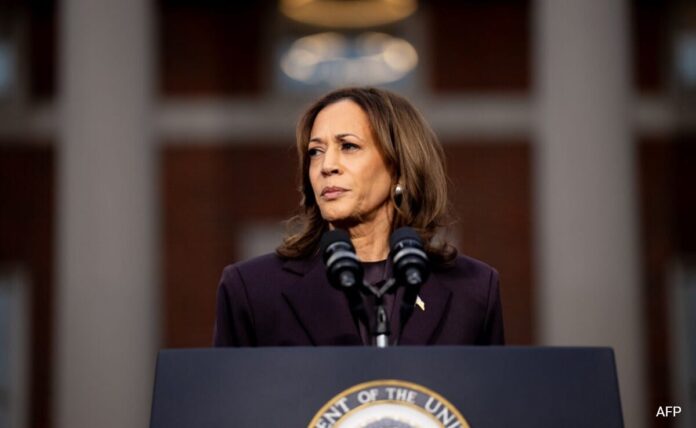New Delhi:
US Vice-President Kamala Harris conceded the 2024 presidential race to Donald Trump, ending a campaign many Democrats hoped would usher in the country’s first female president. In her speech, Kamala Harris accepted the people’s mandate for Trump after what was a hard-fought campaign.
Struggles with Biden ties and defining her own path
Harris’ campaign struggled from the very beginning, with issues that later proved insurmountable. According to a report in CNN, key moments, including her appearance on ABC’s ‘The View,’ showcased her challenge in differentiating herself from the Biden administration. Asked what she would have done differently from Biden, Harris said, “There is not a thing that comes to mind.” Realising the potential misstep, she added that she would consider including a Republican in her Cabinet.
Despite efforts from campaign aides to clarify her stance, the perception that she was closely tied to Biden’s policies became a persistent hurdle. According to a Democratic source, who spoke to CNN, Harris avoided highlighting her differences with Biden on key policies, such as capital gains taxes and child tax credits, out of loyalty. Yet, as the campaign progressed, she appeared hesitant, losing the confident approach that characterised her earlier appearances.
Difficulty in building voter trust and support
Political observers and senior campaign aides pointed to Harris’ inability to establish a clear identity apart from Biden as one of the key reasons for her struggle to connect with undecided voters. By the time she began articulating stronger views on contentious issues, such as Biden’s support for Israel and his handling of the economy, many voters had already formed their impressions, leading some to turn towards other candidates.
In retrospect, some Democratic strategists argue that Biden’s continued influence over the party might have inadvertently hindered Harris’ chances. The CNN report said that a few aides had even urged Biden to step back following the 2022 midterms to allow for a primary process that could have better prepared the party’s candidate for the general election.
Late optimism fails to deliver
Harris’ campaign was marked by a rollercoaster of optimism and frustration. In the weeks leading up to Election Day, there was some hope among senior campaign staffers as Harris appeared to gain momentum in key battleground states. Yet, it was all short-lived. Aides cited a powerful ground campaign and endorsements from prominent figures, including Liz Cheney and former President Bill Clinton, as evidence of their strength. But that extensive network and high-profile support proved insufficient.
“I can’t imagine… what it would be like if Donald Trump won because he is telling us such dark and sinister things that he’s going to do, and I believe him,” New Jersey Senator Cory Booker said in an interview during a campaign event in Pennsylvania, one of the crucial battleground states. Booker stressed the need for Democrats to stay engaged, regardless of the outcome, telling his staff that resilience is essential.
Tensions within Harris’ campaign also emerged as a significant factor. The sudden campaign reshuffle in July, when she replaced Biden as the Democratic candidate, left her team feeling underprepared. Campaign insiders reported internal disputes regarding Harris’ running mate, with Pennsylvania Governor Josh Shapiro initially seen as a strong choice due to his appeal in key swing states. Harris ultimately selected Minnesota Governor Tim Walz, someone she felt aligned more with her campaign values. Yet, this decision raised eyebrows among some Democrats, who felt Shapiro would have provided a stronger counterpoint to Trump’s candidacy.
As results poured in on election night, the mood at Harris’ campaign headquarters shifted rapidly. Anticipation turned to disappointment as it became evident that Trump was pulling ahead.




